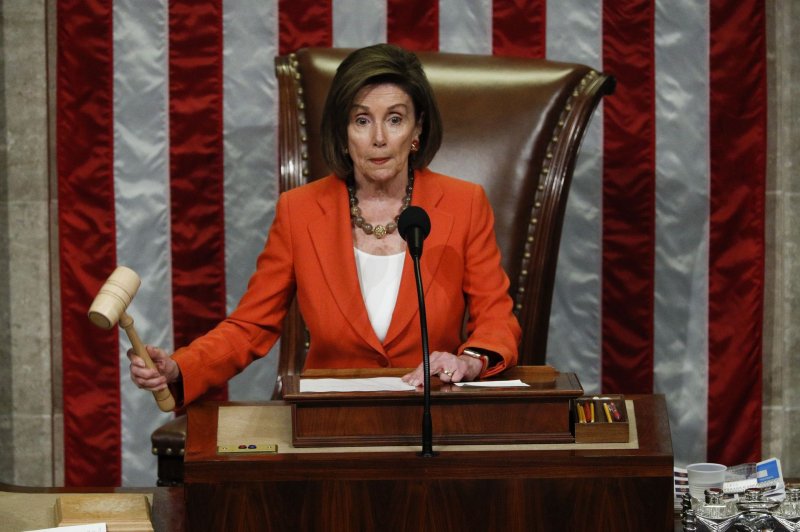1 of 3 | House Speaker Nancy Pelosi wields the gavel as the U.S. House of Representatives votes for a resolution that sets up the next steps in the impeachment inquiry of President Donald Trump. Pool Photo by Tom Brenner/UPI |
License Photo
Oct. 31 (UPI) -- The U.S. House voted for a resolution Thursday that formally authorizes the impeachment investigation of President Donald Trump -- a major step that's only been taken by the lower chamber four other times in U.S. history.
The lower chamber voted 232-196 in favor of House Resolution 660. The vote split mostly down party lines, with four members abstaining. No Republican voted for the resolution and two Democrats -- Reps. Collin Peterson of Minnesota and Jefferson Van Drew of New Jersey -- voted against the resolution. One independent lawmaker, former Republican Justin Amash of Michigan, favored the bill.
Among other things, the measure directs "certain committees to continue their ongoing investigations as part of the existing House of Representatives inquiry into whether sufficient grounds exist for the House of Representatives to exercise its constitutional power to impeach Donald John Trump, president of the United States of America, and for other purposes."
The resolution also enables Republicans to request witnesses and documents, authorize committees to release interview transcripts and outline public hearings. It also allows Trump and White House counsel to attend hearings, question witnesses and recommend additional testimony and evidence.
Thursday's authorization is the first major step toward an impeachment of Trump.
"The Greatest Witch Hunt In American History!" the president tweeted after the vote.
In a statement after the vote, the White House defended Trump and faulted Democrats for trying to "destroy" his presidency.
"[House Speaker] Nancy Pelosi and the Democrats' unhinged obsession with this illegitimate impeachment proceeding does not hurt President Trump; it hurts the American people," White House press secretary Stephanie Grisham said. "Instead of focusing on pressing issues that impact real families, like reducing gun violence or passing the USMCA, improving healthcare, lowering proscription drug costs, securing our southern border, and modernizing our aging infrastructure, the Democrats are choosing every day to waste time on a sham impeachment -- a blatantly partisan attempt to destroy the president."
The Trump administration has also been critical of what it insists is a lack of due process.
Pelosi called for the vote after the White House and congressional Republicans complained the investigation hadn't received a full floor vote.
"The process determining whether he should be impeached will be open to the public view, just as it should be," House rules committee Chairman Jim McGovern, D-Mass., said earlier.
Three House committees -- on intelligence, foreign affairs and oversight -- are leading the investigation, which seeks to learn whether Trump threatened to pull military aid to Ukraine as a pressure tactic for Kiev to investigate Democratic presidential candidate Joe Biden and his son, Hunter, who formerly worked for a Ukrainian gas company.
So far, investigators have heard from more than a dozen witnesses in the case -- including current and former members of the Trump administration. The administration has blocked testimony from some of the witnesses, resulting in multiple subpoenas
Many Republicans have been critical of the guarded, private way Democrats have so far led the inquiry -- leading several to storm the deposition last week of a Ukraine policy expert in the Defense Department.
"It's been limited and closed and frankly I think we're moving toward a preordained result," said Rep. Tom Cole, R-Okla., the ranking Republican on the rules committee.
Rep. Jim Jordan, R-Ohio, has called the inquiry a "sham" process and Florida Rep. Matt Gaetz called it "totally antithetical to our constitutional principles." Gaetz led the Republican group that interrupted last week's deposition.
Only four other U.S. presidents have ever been the subject of formal impeachment investigations -- James Buchanan in 1860, Andrew Johnson in 1868, Richard Nixon in 1974 and Bill Clinton in 1998. Johnson and Clinton were impeached, but acquitted in the Senate. The House decided against impeaching Buchanan and Nixon resigned before lawmakers could vote in his case.
Earlier this week, investigators questioned Lt. Col. Alexander Vindman, who became the first active White House official to testify in the case. Others who have also spoke to committee investigators are U.S. Ambassador to Ukraine William Taylor and Ambassador to the European Union Gordon Sondland.
Thursday, investigators were scheduled to depose Tim Morrison, a former National Security Council leader on European and Russian policy. He was party to the July 25 phone call between Trump and Ukrainian President Volodymyr Zelensky, during which the American leader spoke about investigating the Bidens. Democrats believe he has direct knowledge of the military aid that Trump temporarily withheld.
Politico reported Thursday that former national security adviser John Bolton and two White House attorneys are scheduled to give depositions next week -- Bolton on Nov. 7 and National Security Council attorneys John Eisenberg and Michael Ellis on Nov. 4. If he appears, Bolton would be the highest-ranking official yet to give testimony in the impeachment proceedings.















